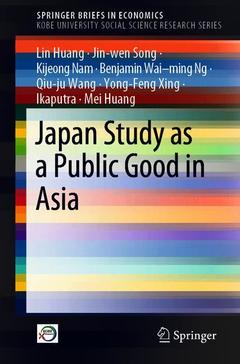Description
Japan Study as a Public Good in Asia, 1st ed. 2019
Kobe University Social Science Research Series
Authors: Huang Lin, Song Jin-wen, Nam Kijeong, Ng Benjamin Wai–ming, Wang Qiu-ju, Xing Yong-Feng, Ikaputra , Huang Mei
Language: English
Subjects for Japan Study as a Public Good in Asia:
Approximative price 52.74 €
In Print (Delivery period: 15 days).
Add to cartSupport: Print on demand
Description
/li>Contents
/li>Comment
/li>
Chapter 1 covers Japanese social welfare system reform and transformation of social governance. Chapter 2 deals with the decreasing birthrate and national security. Chapters 3 to 5 discuss three aspects of the impact of modern technology on Japanese society. Chapter 6 and 7 include the research results on recovery from the earthquake disasters in Indonesia and East Japan.
Through reading this book, the increasingly necessity to capture Japanese studies in Asia as a public good can be understood. The authors believe that sharing of knowledge as a public good is of great help in solving problems for the future.
1 Japanese Social Welfare System Reform and Transformation of Social Governance 7
1.1 Basic Conceptions and Understanding of Japan’s Social Welfare Reform 7
1.1.1 Social Welfare, the Welfare State, the Welfare Society 8
1.1.2 Social Governance 9
1.2 Institutional Reform and Transformation in Management Format 101.2.1 The Administrative Measures Model of Welfare 10
1.2.2 Institutional Reform of Japan’s Welfare System 11
1.2.3 Shift to Local Welfare 12
1.3 The Outcomes and Problems of the Institutional Reform 14
1.4 Conclusion 16References 19
2 Aging Population, Decreasing Birthrate and National Security 20
2.1 Outline of Japan’s defensive power and population problem 20
2.2 National Defense Plan and Population Problems in Korea 27
2.3 Conclusion 32
References 34
Part 2 Technological Innovation and Society Changes 36
3 The Impact of Modern Technology on Japanese Studies 37
3.1 A Brief History of Modern Technology in Japanese Studies 37
3.2 Pros and Cons of Using Modern Technology in Japanese Studies 40
3.3 Concluding Remarks 42
4 Social technology research in Japan as a public good 43
4.1 Introduction: the problem 43
4.2 An examination of social technology research in Japan 454.3 What social technology research in Japan suggests 47
4.4 Conclusion 49
References 51
5 The new overseas Chinese in Japan: What case studies tell us 52
5.1 The development of research and its challenges 52
5.2 Research subjects and method 54
5.3 What the survey tells us 55
5.3.1 The state of identity: Japan and China in life 55
5.3.2 On nationality 56
5.3.3 Relationship with the host society 56
5.4 On the future 58
5.5 Conclusion and remaining challenges 58
Part 3 Robust Society against Natural Disasters 60
6 People with Different Ability and Disaster-Lesson Learnt from Jogjakarta Post Earthquake 2006-2016 61
6.1 Different ability 61
6.2 The Jogjakarta Earthquake 2006 62
6.3 post-earthquake experience 64
References 65
7 Advertising media channels and post-disaster destination: a case of Japan 66
7.1 Research on destination post-disaster recovery 66
7.2 Tourist advertisement 66
7.3 The Great East Japan Earthquake 67
7.4 Research hypothesis 68
7.4.1 Post-disaster destination recovery 687.4.2 Destination attraction perception 68
7.4.3 The factor of risk 68
7.4.4 Advertising effectiveness via different media 69
References 71
Describes and clarifies how common problems can be resolved in Japan and Asia
Collects results from researchers in Japan, China, South Korea, and Indonesia
Focuses on birthrates, aging society, technological innovation, societal changes, and recovery from natural disasters




